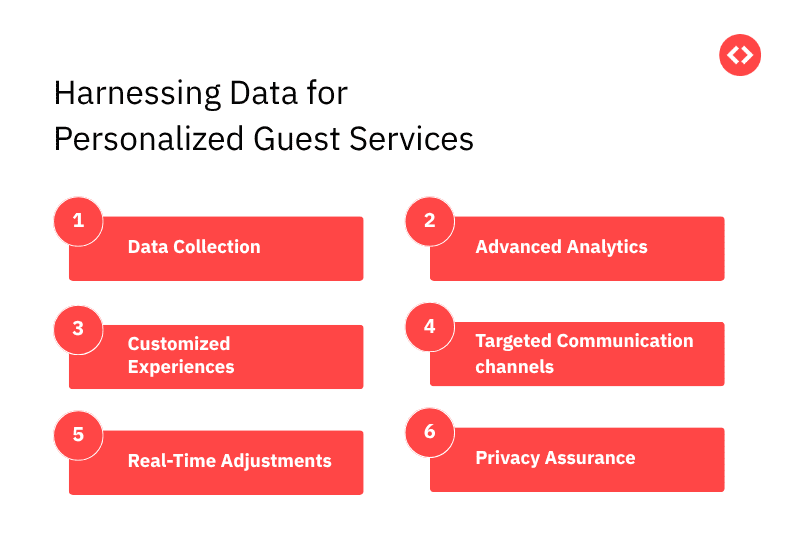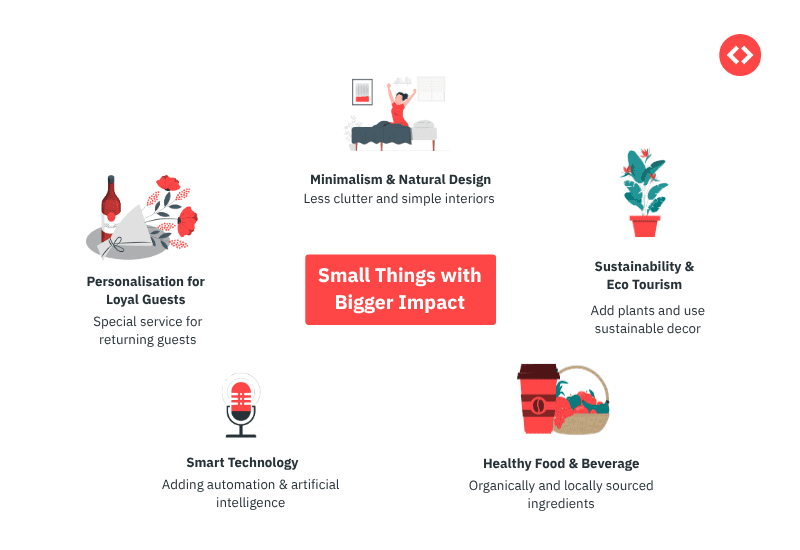Table of Contents
Updated : Nov 3, 2025
Are you a boutique hotel owner or manager looking to stay ahead of the curve? With the hospitality industry evolving rapidly, it’s crucial to keep your finger on the pulse of boutique hotel management trends. As we look toward 2026, guest expectations are changing, technology is advancing, and competition is getting more intense. Let’s dive into the top trends in boutique hotel management for 2026, so you can deliver exceptional experiences, maximize revenue, and secure your spot as a market leader.
1. Hyper-Personalization: The Heart of Boutique Hotel Management
Personalization has always been a cornerstone of boutique hotel management, but in 2026, it’s taking center stage. Your guests don’t want cookie-cutter experiences—they crave tailored stays that reflect their preferences and lifestyles.
How can you achieve this?
– Leverage technology: Use guest data to anticipate needs and customize services. Whether it’s room temperature, pillow type, or favorite snacks in the minibar, every detail counts.
– Offer curated local experiences: Partner with local businesses to provide unique tours or culinary adventures tailored to guest interests.
– Create flexible packages: Let guests build their own stay—spa treatments, dining options, late checkouts—so they feel truly in control.
Boutique hotel management is all about treating guests as individuals. By focusing on hyper-personalization, you’re not just meeting expectations—you’re exceeding them.
2. Tech-Driven Operations: Boutique Hotel Technology Takes Over

If you’re still managing reservations with spreadsheets or sticky notes, it’s time for an upgrade. Boutique hotel technology has evolved dramatically and is now essential for streamlining operations and enhancing guest satisfaction.
What should you focus on?
– Cloud-based PMS (Property Management Systems): PMS integrates seamlessly with booking engines, housekeeping, and POS systems, making your daily tasks effortless.
– Mobile check-in/check-out: Guests appreciate contactless solutions that save time and add convenience.
– Smart room controls: Allow guests to control lighting, temperature, and entertainment from their devices.
– AI-driven chatbots: Offer instant answers to guest queries around the clock.
Incorporating boutique hotel technology isn’t just practical—today’s tech-savvy travelers expect it. By embracing these tools in your boutique hotel management strategy, you’ll improve efficiency and delight your guests.
3. Sustainability: A Core Pillar of Boutique Hotel Trends
Eco-friendliness is no longer a niche trend; it’s a must-have in boutique hotel management for 2026. Guests are increasingly conscious of their environmental impact and expect hotels to do their part.
How can you lead in sustainability?
– Energy-efficient systems: Invest in LED lighting, motion sensors, and smart thermostats.
– Waste reduction: Say goodbye to single-use plastics; opt for reusable or biodegradable alternatives.
– Local sourcing: Support nearby farmers and artisans by featuring local products in your restaurant and gift shop.
– Green certifications: Pursue third-party certifications like LEED or Green Key to showcase your commitment.
Sustainability isn’t just good for the planet—it’s also great for your brand reputation. Make it central to your boutique hotel management approach.
Transform your hospitality approach today
Discover actionable strategies tailored for small hotel owners and managers creating unforgettable stays for your guests & expanding revenues for your hotel!
Start your 30-day FREE trial now!4. Wellness-Focused Guest Experience Innovation
Wellness travel is booming, and it’s becoming a key part of boutique hotel trends for 2026. Guests are seeking more than relaxation—they want holistic well-being during their stay.
Ways to enhance wellness in your property:
– In-room fitness options: Yoga mats, resistance bands, or streaming fitness classes.
– Healthy menus: Plant-based dishes and locally sourced superfoods on your menu.
– Spa partnerships: Collaborate with local therapists or offer pop-up wellness sessions.
– Mindfulness spaces: Create quiet zones for meditation or reading.
By integrating wellness into your guest experience innovation strategy, you’ll attract health-conscious travelers who prioritize self-care while traveling.
5. Experiential Design: Storytelling Through Space
Boutique hotels have always stood out for their unique character—and that won’t change in 2026. In fact, experiential design is now at the forefront of boutique hotel management trends.
What does this mean for you?
– Thematic design elements: Tell a story with your décor—whether it’s inspired by local history or contemporary art.
– Immersive spaces: Create Instagram-worthy moments that encourage sharing and engagement.
– Flexible common areas: Think co-working lounges by day that transform into cocktail bars at night.
6. Embracing Community: Local Collaborations & Authenticity
Today’s travelers crave authentic local experiences. In boutique hotel management for 2026, building strong ties with your community will set you apart from bigger chains.
How can you foster these connections?
– Host local events: Bring artists or musicians into your space for pop-up performances.
– Feature local products: Stock guest rooms with locally made toiletries or snacks.
– Promote hidden gems: Recommend off-the-beaten-path attractions rather than tourist hotspots.
Community engagement is a powerful way to enrich the guest experience while supporting those around you—a win-win in any boutique hotel management playbook.
7. Data-Driven Decision Making: The Smart Manager’s Secret Weapon
Data isn’t just for big brands anymore. In boutique hotel management for 2026, using analytics can help you make smarter decisions across every department.
Where can data help most?
– Revenue management: Dynamic pricing tools maximize occupancy while optimizing rates.
– Marketing strategies: Track which channels generate bookings and adjust campaigns accordingly for marketing strategies.
– Guest feedback analysis: Use reviews and surveys to identify areas for improvement.
By leveraging data as part of your boutique hotel technology suite, you’ll operate more efficiently—and see better results on your bottom line.
8. Security & Privacy: Building Trust Through Protection
With all this technology comes responsibility. Cybersecurity will be vital in boutique hotel management as guests expect both convenience and protection of their personal information.
Best practices include:
– Regular system updates
– Data encryption
– Staff training on privacy protocols
Showcasing strong security measures will reassure guests—and keep your reputation intact as one of the leaders following top boutique hotel trends for 2026.
Way Forward: Stay Ahead by Embracing Change

As an owner or manager, staying informed about these boutique hotel trends for 2026 ensures that you’re prepared not just to meet but to exceed guest expectations through continuous guest experience innovation. Every decision you make—from embracing new technologies to curating personalized experiences—will position your property as a leader in modern hospitality.
Frequently Asked Questions
What are the most important technology trends shaping boutique hotel management in 2026?
The most significant technology trends impacting boutique hotel management include smart room controls, contactless check-in/check-out processes, AI-driven guest services, cloud-based property management systems, and advanced data analytics for personalized marketing and revenue optimization.
How can boutique hotels enhance guest experience innovation in 2026?
Boutique hotels can boost guest experience innovation by leveraging CRM systems for personalized interactions, offering curated local experiences, providing flexible spaces for work or relaxation, training staff in service excellence, and integrating sustainable practices that align with guests’ values.







